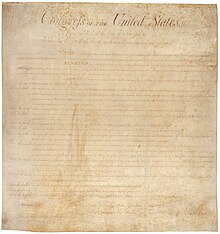10. Amendment to the United States Constitution
The 10th Amendment to the Constitution of the United States of America , which is part of the US Bill of Rights , states:
- Powers, which the Constitution does not confer on or withdraw from the States, are reserved to the State or the people.
It is listed in the bill of law passed by the US Congress as the twelfth article ("Article the twelfth").
The constitutional amendment makes it clear that the power of the federal government is limited only to the rights that the constitution grants it. In the United States vs. Sprague In 1931 the Supreme Court noted that the amendment did not change the original constitution. From time to time the government and federal governments have attempted to seek an exemption from various federal regulations, particularly in the areas of labor and environmental control, by using the 10th Amendment as a basis for their concern.
History and precedents
The jurisdiction clause
The 10th Amendment is sometimes cited as a constitutional reason denying Congress the right to pass any law it deems legitimate. However, Congress has made its authority clear in the jurisdiction clause, which provides that it has the right to pass laws in the field of human rights that are not mentioned in the Constitution. If any particular act affects national jurisdiction in any way, Congress has the right to regulate those acts.
Many expansions in government power during the 1930s were put down by the Supreme Court until President Franklin D. Roosevelt tried to increase the number of judges to 15 and fill the offices with like-minded judges. Although unsuccessful, the Supreme Court changed its position from a poor interpretation of the jurisdiction clause and broadened the powers of Congress over domestic jurisdiction.
In the Wickard v. Filburn , the Supreme Court ruled that national crop price controls must ensure that wheat grown on a farm must be used to feed the owners and their animals. The rationale was that the wheat that a farmer grows is compensation. If the farmer had not grown the wheat and consumed it himself, it would have been necessary to get the wheat from someone else. It was also made clear that allowing farmers to sell their own wheat would affect the domestic wheat market.
In the Garcia v. San Antonio Metropolitan Transit Authority in 1985, the Supreme Court announced that it would no longer hear cases involving the 10th Amendment; because the political process ensures that laws that unduly burden states cannot be promulgated by Congress.
In the United States v. Lopez's law that provided gun-free zones around public schools was stopped because it was not covered by the constitution.
Provision of federal funds
One controversial practice by Congress was that it stopped granting federal funds to certain states if those states did not align their laws with national guidelines. Examples include the national speed limit of 55 mph (89 km / h) and the restriction on selling alcohol only to people aged 21 and over. The states would have lost grants to build highways if they hadn't passed these laws.
State Resolutions 2009
In response to the Obama administration's budget of more than $ 1 trillion in deficit, various states have passed resolutions to oppose state-level dominance of federal agencies. So far, eight states have already passed this, including Arizona, Hawaii, Montana, Michigan, Missouri, New Hampshire, Oklahoma and Washington.
Observers of this trend expect up to twenty more states to join, including Alaska, Alabama, Arkansas, Colorado, Georgia, Idaho, Indiana, California, Kansas, Nevada, Maine, and Pennsylvania.
